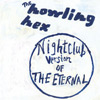The Howling Hex, "Nightclub Version of the Eternal"
 Neil Michael Hagerty has certainly paid his dues, from his early days with Pussy Galore to his years with Royal Trux, and if he doesn't always enjoy the reputation he deserves, it's certainly not for lack of trying.
Neil Michael Hagerty has certainly paid his dues, from his early days with Pussy Galore to his years with Royal Trux, and if he doesn't always enjoy the reputation he deserves, it's certainly not for lack of trying.
If anything, he's been more prolific than ever with his Howling Hex project. In recent years, he's released a number of albums, some of them on limited vinyl, and last year's You Can't Beat Tomorrow even came with a DVD with the pilot of a half hour variety show of the same name. Such a shame, then, that he would release a dull album as undistinguished as this one. The group is a trio this time around, with hand drums replacing a more conventional rock kit. It's an effective substitution, but the album needs more than that to save it. Hagerty's use of the baritone guitar in the place traditionally held by the bass is an attempt at versatility but isn't quite so smooth. Perhaps the instrument's partly to blame. I've heard other bands try to use the baritone similarly and it's a tough one to pull off. Instead of a satisfying combination of the best aspects of both a guitar and a bass, it often doesn't sound enough like either. For example, when Hagerty tries to get funky on "Lips Begin to Move," the instrument comes off surprisingly flat.
"Hammer and Bluebird" and "Six Pack Days" are probably the most fully realized tracks on the album, yet even these aren't without their indulgences. "How Many Steps Now" isn't far behind, but the chorus eventually becomes tiresome in its repetition. As much as every song's male and female dual vocals remind me of Hagerty's previous group, they're still the biggest draw here and perhaps the most enjoyable element overall. In fact, these are just about the only sections that work, period. What I don't like is the noodling in between the vocal parts in which I find my mind wandering as much as the guitarist does. The worst part about these songs, though, is their length. Each one goes on far too long and the improvised parts have too few changes or other instrumental interplay to support them.
Trimming the fat on these would severely reduce the running time of the album, but it would make it far more enjoyable.
samples:



